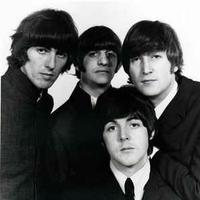In The Cavern
On their second trip to Hamburg, a record producer asked the Beatles to play on a record for the singer Tony Sheridan. The song was 'My Bonnie Lies Over the Ocean' and they played as the Beat Brothers. The boys were becoming successful. But one of the band decided that he didn't want to be a Beatle. Stu met a young photographer, Astrid Kirchherr, in Hamburg. Her photos of the band later became famous. She also helped the band's look. One day, she cut Stu's hair. At first, the others in the band laughed - they all pushed their hair back off their faces like rock and roll singers. But later John, Paul and George all had the same haircut. After the band's second trip to Hamburg, Stu decided to stay there. He was in love with Astrid and he wanted to study art in Hamburg. Paul never had a high opinion of Stu's playing, and he started to play the bass. Back in Liverpool, people were interested in the new band 'from Hamburg'. At first, someone told John, 'You speak good English.' But the band became more and more popular in their home city. They often played at a club called The Cavern. Hundreds of fans crowded into the small, dark club when the Beatles played there.
The band was famous now in Liverpool, but was that enough? Everything changed when they met Brian Epstein. He was the manager of a big music shop in the city. When he heard about the Beatles, he went to The Cavern. In his suit and tie, Epstein probably looked very different from The Cavern's young crowd. In his opinion, the band were a little rough. But, he has said. 'I immediately liked what I heard.' Epstein met the band and offered to become their manager. When he promised to make an agreement with a record company, the band said yes!
Brian Epstein immediately gave the band new rules. They couldn't eat, drink or smoke on stage. The four young men started wearing suits. Epstein worked hard for the band and on the last day of 1962, they drove down to London. They played for Decca, a big record company, but it didn't go well. Two months later, the company said no to Brian Epstein and the Beatles. In their opinion, guitar bands weren't popular now. Worse news came from Germany. Stu was ill with terrible headaches. He died in April 1962, a day before the Beatles' third trip to Hamburg. He was only twenty-one. During the band's third trip to Hamburg, they received a message from their manager. Another record company, Parlophone - part of the big company EMI - wanted to hear them in the studio.

